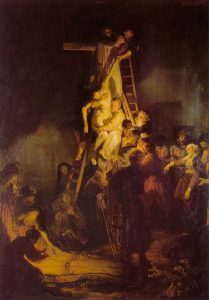Good Friday 2011, Most Reverend Paul D. Etienne
While praying the Stations of the Cross one Friday during this Lent, I had an intense insight into the reality of sin. I was uniquely aware of the reality of my own sin and the significant damage it does to my relationship with God. In this moment, I was aware of how Jesus enters into this darkness of sin in order to not only make restitution and atonement for it, but in a real way to be present to us in our sinfulness. In this presence, he not only brings forgiveness, but also healing. The scripture passage I was keenly aware of in this moment was from St. Paul’s Second Letter to the Corinthians 5:21: For our sake he made him to be sin who knew no sin, so that in him we might become the righteousness of God.
This Lenten “experience” is the lens through which I wish to speak to the events of this Good Friday. I want to speak a bit more about this experience of sin, and the strange phrase of St. Paul that God made Jesus to be sin. When we are honest about our own sin, we can begin to name for our self the darkness that is a part of it. This darkness is real, because sin separates us from the Light of Christ and from the Love of God. Sin literally “weighs us down” as the cross was a horrific burden for Christ to bear, so much so that Simon of Cyrene was required to carry the cross for Christ.
Sin can even separate us from our very self, which in a strange sense is a negative way of speaking to the truth of who we are in the depths of our being; we are “a relationship with the Divine”. This speaks to the reality that is at the heart of our Christian understanding of the dignity and sanctity of every person. We bear a spark of the Divine within us. This is the presence of the soul.
So how is it that Jesus became sin? The Prophet Isaiah speaks to this reality with great eloquence:
Surely he has borne our infirmities and carried our diseases; yet we accounted him stricken, struck down by God, and afflicted. But he was wounded for our transgressions, crushed for our iniquities; upon him was the punishment that made us whole, and by his bruises we are healed. Like sheep, we all have gone astray; we have all turned to our own way, and the Lord has laid on him the iniquity of us all. (Isaiah 53:4-6)
The paradox in Jesus becoming sin is that even though sin separates us from God, and Jesus experienced this “pain” on the cross, yet at the same time, he was never separated from the Father. Blessed Pope John Paul II spoke to this paradox in his encyclical, Novo Millennio Ineunte:
In order to bring man back to the Father’s face, Jesus not only had to take on the face of man, but he had to burden himself with the “face” of sin. (see 2 Cor 5:21) We shall never exhaust the depths of this mystery. All the harshness of the paradox can be heard in Jesus’ seemingly desperate cry of pain on the cross: “My God, my God, why have you forsaken me?” (Mk 15:34) Is it possible to imagine a greater agony, a more impenetrable darkness? … Theological tradition has not failed to ask how Jesus could possibly experience at one and the same time his profound unity with the Father, by its very nature a source of joy and happiness, and an agony that goes all the way to his final cry of abandonment. (NMI ## 25-26)
In this paradox of Jesus on the cross, feeling the intense separation created by sin, while at the same time experiencing the faithful presence of the Father, is the expression of our being reconciled to God in the person of Jesus, in His passion, suffering and death. This “paradox” is to be a “turning point” for us, in how we seek to remain with the Father in moments of temptation. The Father’s faithful presence to Jesus is a teaching to us that we are never abandoned by the Father’s love, even in our free choice to sin, and it is the Father’s intense desire to hold us close to Him through His Son.
St. Catherine tells us that this holy desire of Jesus for our salvation was a source of intense suffering for him; a suffering He bore from the moment the Word was sown in the womb of Mary. Because his desire for our salvation was infinite, this interior suffering of Jesus was far greater than the finite suffering he experienced on the cross. As St. Paul reminds us, this intense desire of Jesus is to reconcile us to God, to restore this life-giving relationship that is damaged by sin. This “thirst” Jesus speaks of in his dying breath is the fulfillment of his desire for our salvation. His “thirst” is finally quenched with His final words: “It is finished”.
With these words, the final act of fulfilling the Father’s will is accomplished. In these events we recall today, the work of the Father in the person of Jesus is complete, and God has reconciled us to Himself. This is the gift being offered from the Cross. The question facing each person today is: are we disposed and prepared to receive this precious gift? God has reconciled us to Himself. Are we prepared to be reconciled to God?
0